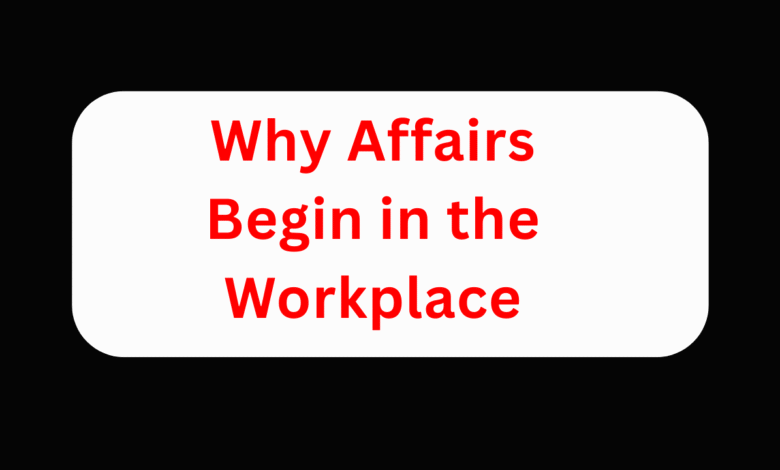Why Affairs Begin in the Workplace

Affairs can start in many places, but one of the most common places is the workplace. Many people spend more time at work than at home. They meet colleagues every day, share tasks, travel together, and face challenges side by side. Slowly, these connections can sometimes cross the line from professional to personal.
Even people in strong marriages can be tempted by workplace affairs. But why does this happen so often Where does the attraction begin And why is the workplace a risky environment for loyalty In this article, we will explore the main reasons why affairs begin in the workplace and how they affect relationships.
Daily Proximity and Time Together
The first reason is simple. People spend many hours every day with colleagues. Sometimes they spend more time with them than with their own spouse. Working late nights, attending meetings, or traveling for office projects creates closeness.
When people see each other daily, they begin to share small details of life. Over time, this constant proximity can create emotional attachment, which may turn into an affair if boundaries are not respected.
Sharing Common Goals
Colleagues often work toward the same goals. They face stress together, celebrate success together, and sometimes even complain about the same problems. This teamwork creates a sense of partnership.
When someone feels that a colleague understands their struggles more than their spouse does, emotional connection begins. This bond can easily cross into personal attraction.
Emotional Support at Work
Work can be stressful, and sometimes people need emotional support. If a colleague is always available to listen, comfort, and encourage, it can feel very meaningful.
This support may start innocently but slowly replace the emotional role of a spouse. When people start depending on colleagues for comfort, the workplace becomes a place where affairs can begin.
Praise and Validation
Many affairs start because of attention and compliments. A colleague may notice small things like a new hairstyle, good presentation, or hard work. This validation makes a person feel attractive and valued.
At home, spouses sometimes forget to give compliments because of busy life. When someone at work provides this missing validation, it feels exciting. This excitement can slowly lead to deeper attraction.
Similar Interests
People who work together often share similar interests, like career goals, skills, or hobbies. They may talk about things that their spouse does not understand. This creates a feeling of connection.
For example, two colleagues in the same field may feel they “get” each other more than anyone else. This feeling of being understood can turn into an emotional bond that risks becoming an affair.
Opportunity and Secrecy
The workplace provides both opportunity and secrecy. Business trips, late meetings, or office events give private time together. Unlike family or social gatherings, these situations often go unnoticed.
The secrecy itself can make the connection more tempting. People feel they can hide workplace interactions more easily than other types of relationships.
Stress and Escape
Work stress can make people crave escape. An affair at work may feel like a break from daily pressure. Sharing jokes, having coffee together, or secret chats may give temporary relief from stress.
But what starts as an escape often grows into something more serious. This shows how workplace pressure can create dangerous situations for loyalty.
Weak Boundaries
Affairs also begin because people fail to keep clear boundaries. Flirty jokes, private messages, or casual lunches may seem harmless. But when repeated, they build intimacy.
Without strict boundaries, professional relationships can turn personal. Weak boundaries are one of the most common reasons workplace affairs begin.
Technology and Easy Access
Modern workplaces use technology like emails, messaging apps, and video calls. These tools make communication quick and easy. But they also make secret conversations possible.
A person can send private messages during work hours without being noticed. Technology creates both closeness and secrecy, which can lead to affairs.
Impact on Marriage and Career
Workplace affairs do not only harm marriages. They can also destroy careers. Once discovered, they create distrust in marriage and may lead to divorce. In offices, they create gossip, loss of respect, and even job loss.
An affair that starts with excitement often ends with pain for both personal and professional life.
How to Avoid Workplace Affairs
- Keep conversations professional, not personal.
- Avoid private meetings or secret communication.
- Share your work life openly with your spouse.
- Remember that short term excitement can destroy long term happiness.
- Value loyalty more than temporary pleasure.
Affairs often begin in the workplace because people spend long hours together, share goals, provide emotional support, give validation, and find opportunities for secrecy. Stress, weak boundaries, and modern technology add to the risk.
But the truth is clear. Workplace affairs may look exciting but bring destruction to both marriage and career. Protecting loyalty means setting boundaries, avoiding secrecy, and remembering the value of family and trust.
Love is strongest when it stays loyal, and loyalty is tested most in daily life, including the workplace.




